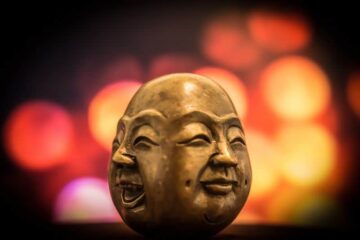The Enneagram is a fascinating model of the human psyche. Everyone should take the test at least once in their lifetime!
Used in therapy, business, and self-development circles, the Enneagram is a powerful tool that can increase your self-awareness, empower you with self-understanding, and increase your self-love.
The Enneagram is also a highly psycho-spiritual model (meaning that it caters to human psychology and spirituality) that can support you on your spiritual journey.
Get ready to learn about your deepest strengths, weaknesses, and gifts in our free enneagram test!

What Type of Inner Work Do You Need?
There are many routes we can take to get us through the depths of our unconscious. Which path should you take?
How Does the Enneagram Work?

The word ‘enneagram’ is composed of the two Greek words ennéa (meaning nine) and grámma (meaning something written). And that is the crux of the enneagram: it reveals the nature of the human personality by dividing it into nine different archetypes.
The interesting thing about the Enneagram is that it possesses a number of different facets that help us to identify:
(1) what we desire more than anything else,(2) what we value the most, (3) what tempts us the most, (4) what causes us the most fear, (5) what our biggest fault is, (6) what our greatest virtue is.
Our enneagram test (bottom of page) will help you to identify these different facets and what you need to pay attention to.
The 9 Enneagram Types

The nine Enneagram types include:
- Type 1 – The Reformer
- Type 2 – The Giver
- Type 3 – The Performer
- Type 4 – The Individualist
- Type 5 – The Observer
- Type 6 – The Loyalist
- Type 7 – The Idealist
- Type 8 – The Challenger
- Type 9 – The Peacemaker
It is common to find a little bit of yourself in all nine Enneagram types. However, one or two of them should stand out for you as revealed by this enneagram test. These are your dominant personality types.
How Understanding the Enneagram Could Transform Your Life
The Enneagram Typology was first conceptualized by the mystic Gurdjieff and developed further by Oscar Ichazo and psychiatrist Claudio Naranjo.
There are several reasons why understanding your Enneagram type is so helpful:
- It helps you to become more objectively aware of your personality “blind spots”
- It assists you in developing more self-love by helping you to understand yourself more
- It encourages you to consciously work on parts of your personality that inhibit your ability to live a harmonious life
- It allows you to develop more awareness of your “higher self” (Soul) by deconstructing your personality
Keep in mind that the Enneagram is more of a system of transformation than a means of labeling and identification. Perhaps the most amazing thing about the Enneagram is that it encourages the development and liberation of the Soul underneath.
Enneagram and Spiritual Awakening

The power of the enneagram lies in its ability to lead us to higher awareness. By helping us to understand the root of our fixations and various neurosis, we learn about our ego structure and where it broke off from Divine consciousness (called the ‘Holy Idea’). We also learn what quality we need to develop in order to deepen our spiritual awakening journey.
In his Enneagram book Facets of Unity, A. H. Almaas writes,
The … view of the Enneagram is that each ennea-type fixation is the expression of a limited mental perspective on reality, and that each of the nine egoic perspectives is the direct result of the loss or absence of the enlightened perception of one of the Holy Ideas … Working with the Enneagram as part of a larger spiritual work, however, leads to a much deeper realization of truth and thus, a freedom from personality patterns.
Take Our Free Enneagram Test!
Now that you have the important background information, it’s time to get started!
Find out what your Enneagram type is in our free enneagram test below. (Don’t forget to share what you got in the comments!) This is one of the best, free, and fast Enneagram tests out there with a description of your type at the end:
What did you get?
Share your results!




I have been studying personality theory for 35 years and see some benefits in all the models from ancient to modern…but I think it is necessary to combine the physical, mental, emotional, and spiritual aspects of humans to see the whole picture. This model is best displayed in the Myers-Briggs Type Indicator in my opinion….but I have concluded they all must be the will of GOD, the prime force in the universe. as generator, operator, destroyer….ergo theofatalism….you could look it up and maybe pass it on…www.schooloftheofatalism.org….thanks
I came up Perfectionist but I don’t understand “At the core of The Perfectionist is the fear of making mistakes because the resentment they direct towards the world is often redirected to themselves.”.
Anyone can explain for me ?
Loyalist
Wow.
First time doing one of these and I’m blown away. The characteristics described of the Individualist have me nailed closer than anything I’ve ever perused and some of it blindsided me as something I need to ponder. I think they were stalking me lol. I have to reread that now actually..
Love and gratitude,
Matthew
Love and Much gratitude
I’ve got Type 2: The Giver.
It’s true and I think I want to change it. Is it possible? The truth is, since I was a kid, I always pleased other people rather than considering my own hapiness. It’s like I’ve been forced to please them but deep in inside myself I won’t do that. Then I regret because at the end I feel and see all the dissapointment, upset, sadness came to me. It’s good to take this test. At least I know how to overcome my inner problems from your guides. So that I wont let anybody to hurt me anymore and put my own happiness and satisfaction as priority because I deserve it. Thank you so much Aletheia!
I am Type 5, The Observer and The Investigator..
The Performer – although, I did answer this a little more in the space of who I was rather than were I am now. But that is a very achiever based thing to say eh! I think this is always my nemesis and I am wary of being the eternal people pleaser.
I came up a Perfectionist… ✌
things, thus I am going to
I think the test is a little difficult. There are a number of questions that have two questions in them. I am not ‘always’ this or ‘never ‘that. Those words do not belong in an assessment. I like the idea of this assessment, but I think the values need to be numbers on a scale, not yes/no… just my .02 cents.
I agree with a numeric value to answer the questions.
I have held specific characteristics in place for years, but then almost 2 yrs ago
my spouse of 24 yrs took his life, leaving me with our teens.
So for example, of course where I was a go getter, now not so much, still dealing with traumatic event lying on top of other things that I would much rather avoid all of it
I understand. I answered as who the person I am now. My change also occured from tragic circumstance that change the life of me and my children negatively I assumed, however, we have to trust and guard our thoughts.. on that mindset optimism abounds. I’m terribly sorry for your loss. My son received a 35yr prison sentence shortly after releasing from prison it’s such a tale of misfortune since the divorce and he’s special needs.. the sweetest kid biggest heart. People came out the woodwork praising my son when he was arrested 1st time. This time he was set up and innocent. I just got him back. I worry he will take his life in there. His release is my birthday 2052. Girl. Its hard. I understand
I agree that the questions are hard …..as they are so on opposite sides . I took the test 2 times and looked at the questions with a little different perspective and saw the answer change on a good handful of questions
first test type 8 Challenger
second time type 1 Perfectionist